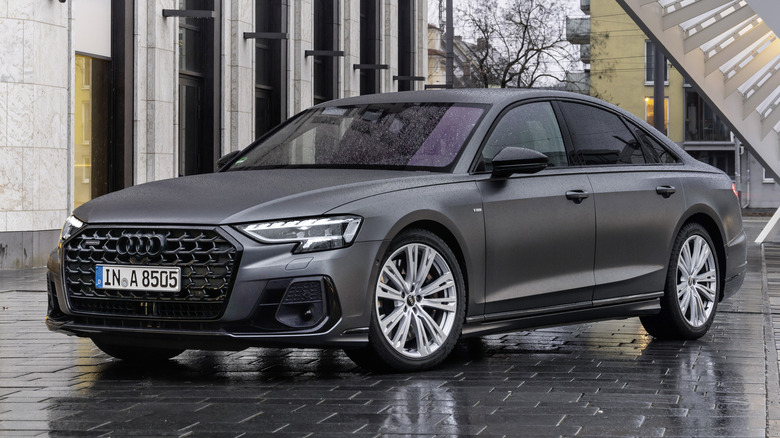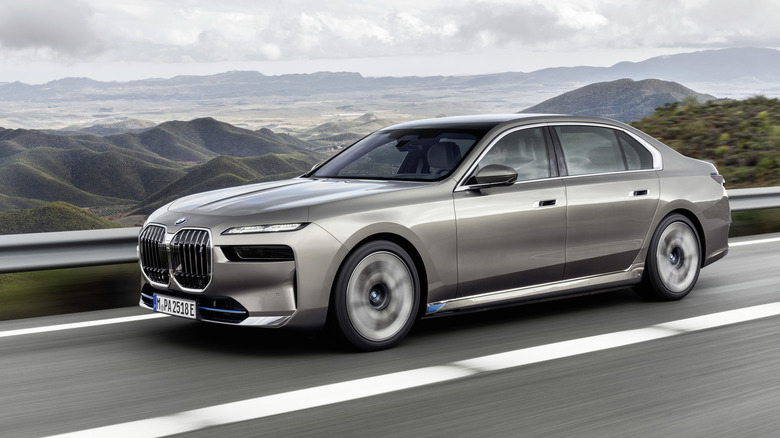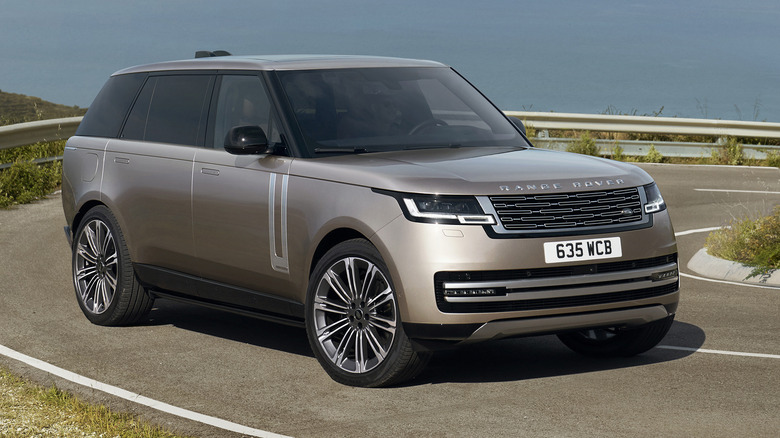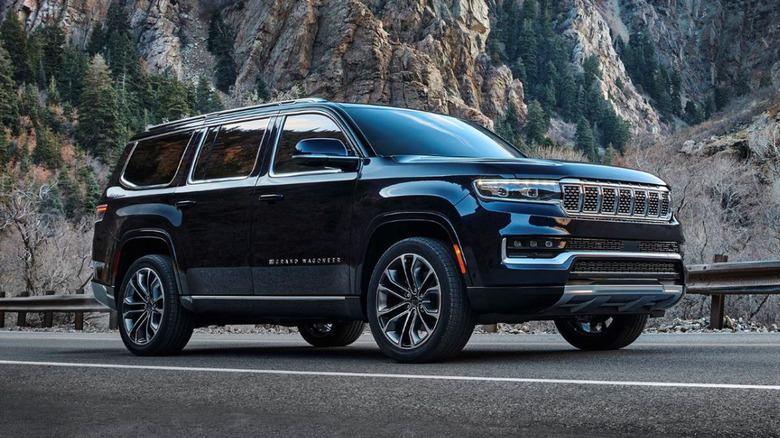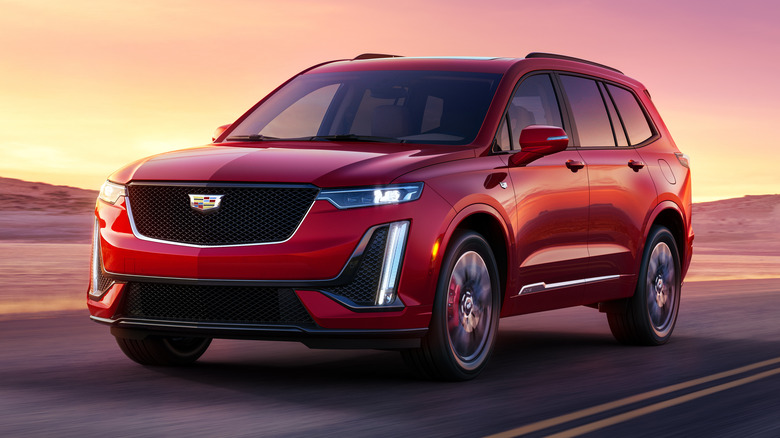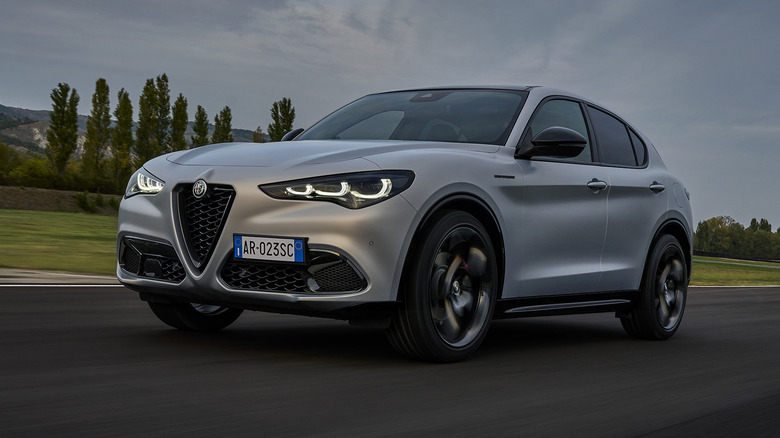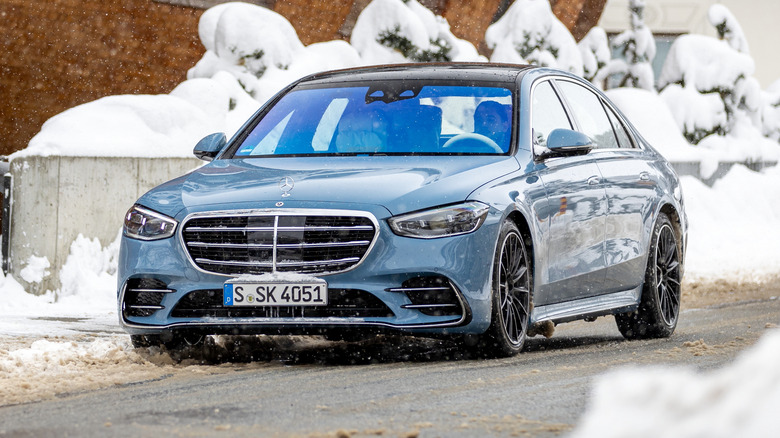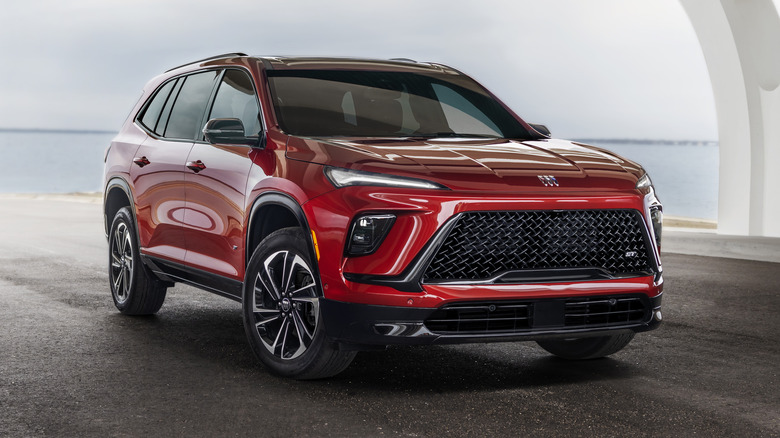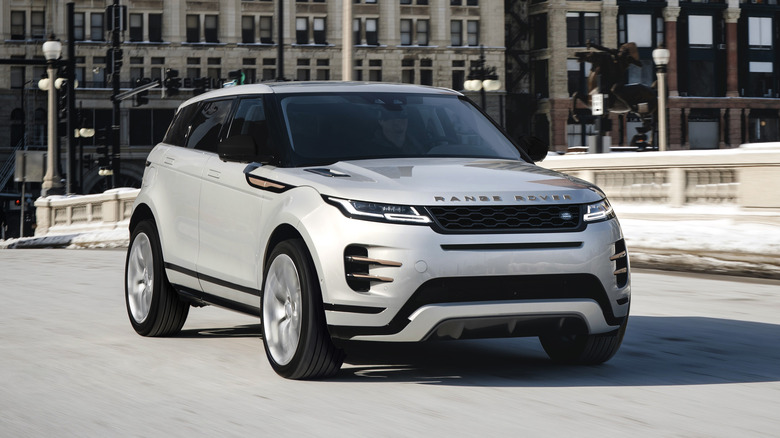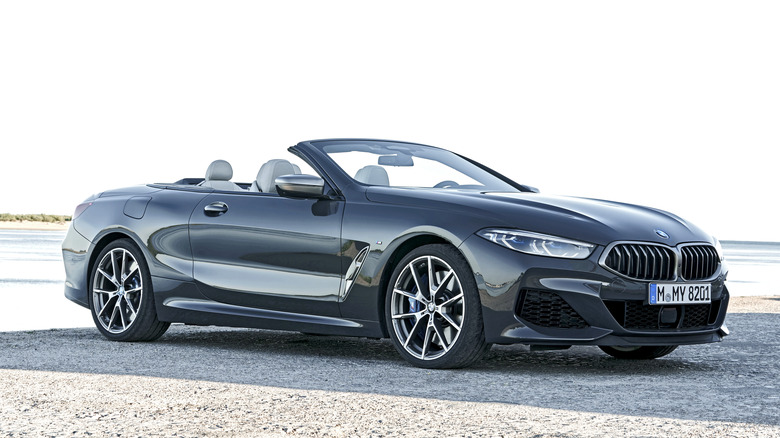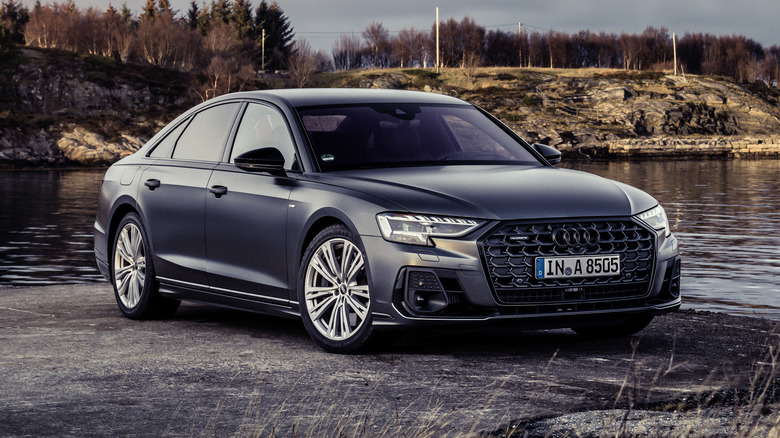10 New Cars You'll Regret Buying When It's Time To Sell
For the vast majority of new car buyers, depreciation is an inevitable part of the buying process. New cars lose a portion of their value as soon as they're driven out of the dealership, and then continue to shed value over the following years. According to KBB, the average new vehicle will be worth 42.4% of its sticker price after five years on the road. However, some models lose value much faster than average.
This makes checking a car's value retention all the more important before buying it, and potentially staying away from the worst performers. After all, no-one wants to end up regretting their new car purchase because they weren't aware how much money they'd be burning during their ownership.
These models score among the lowest on the market for resale value according to data from KBB, with each scoring significantly below the overall average. Some are attainable while others are exclusive flagships aimed squarely for the wealthiest buyers, but all will plummet in value during their first few years on the road, making reselling them a potentially painful experience.
BMW 7 Series – 32.7%
There are a lot of things to like about BMW's flagship 7 Series executive sedan, but its value retention is not one of them. According to KBB, the 7 Series should retain just 32.7% of its original value after five years, well below the overall average. In most other regards, it's a highly appealing car — SlashGear gave the car an Editor's Choice award in 2023, citing its surprisingly sharp driving dynamics and powerful engine as standout features.
Its onboard tech is also impressive, particularly the 31-inch Theater Screen that folds down from the roof to provide cinematic entertainment to the rear seat passengers. Combine that with the "executive lounge seating" and the 7 Series' target market becomes increasingly clear: this is a car to be driven in, not to drive. It's safe to assume that anyone considering a chauffeur as an essential part of their daily transport isn't going to be all that fussed about their car's depreciation levels, which explains why the 7 Series continues to be a popular choice in its segment despite its low value retention.
Land Rover Range Rover – 34.3%
The Range Rover was originally introduced back in 1970 as an upmarket alternative to Land Rover's tough but rudimentary off-roaders. The original incarnation was as much an off-road vehicle as it was a luxury vehicle, but over the decades, the Range Rover has evolved to be more in the latter camp. So, it's no surprise that it depreciates as rapidly as other leading luxury vehicles, with KBB estimating that a new Range Rover will be worth 34.3% of its original sticker price after five years on the road.
Much like the BMW 7 Series, the top-spec Range Rover won a SlashGear Editor's Choice award despite its hefty depreciation. We were thoroughly sold on its combination of refined powertrains, elegant interiors, and all-terrain capability, all of which made the Range Rover one of the most livable luxury cars on the market. Its all-rounder status is slightly overshadowed by the model's notoriously patchy reliability record, but when it's working right, the Range Rover remains unmatched in its segment. It's a good job that it's so impressive to drive — after all, owning a new one will almost certainly be a costly experience.
Jeep Grand Wagoneer – 36.6%
It isn't just British luxury SUVs that fare poorly when it comes to depreciation. Jeep's upscale Grand Wagoneer also disappoints when it comes to retaining value, with KBB calculating that it should retain just 36.6% of its value after half a decade. It is, on average, less costly to purchase upfront – KBB quotes an average sticker price of $93,945 for the Jeep compared to $108,875 for the Range Rover – but that won't be much comfort for buyers when it's time to resell.
At least in the meantime, owners of the Grand Wagoneer will find themselves with an SUV that offers plenty of luxury trappings and boasts one of the most tech-heavy cabins in its segment. Given the seven-slot grille on the front, it's also guaranteed that the SUV will perform well across all terrains too, even if very few buyers are ever likely to stray too far from the asphalt in it.
Cadillac XT6 – 36.3%
It won't be a shock to many to learn that just six-figure luxury cars that fare particularly poorly when it comes to depreciation, but certain attainable luxury vehicles can also be just as bad. The Cadillac XT6 is one such example, with KBB predicting a value retention of 36.3% of its sticker price after five years. The current generation of the car has remained on sale largely unchanged for several years now, but when SlashGear came away with mixed feelings after testing it at launch.
The three-row SUV was a necessary addition to the brand's lineup, given how popular the segment is in the current market, but Cadillac didn't do much to make its offering stand out from the crowd. From its upscale — but not exceptional — interior to its clean but non-descript exterior styling, the XT6 managed to be good but not great in most key areas. That in itself isn't a deal breaker, but paired with the XT6's underwhelming resale values, it might be enough to make some buyers regret their purchase later down the line.
Alfa Romeo Stelvio – 32.6%
The Italian brand's appeal lies in its styling, performance, and dash of Italian flair, but it's safe to say that no one should buy an Alfa Romeo for value retention. Its Stelvio SUV launched for the 2018 model year, promising a unique twist on the popular luxury crossover format. It did indeed stand out from the pack, but this hasn't resulted in standout sales figures — in fact, U.S. sales have slipped significantly over the past two years according to data from CarFigures.
Perhaps part of this decline can be attributed to the Stelvio's poor resale value, with KBB estimating that the car will keep just 32.6% of its sticker price over five years. The Stelvio is also reportedly receiving a new generation soon, with a reveal said to be planned for sometime in 2025. Whether the new generation fares better in terms of value retention remains to be seen.
Mercedes-Benz S-Class – 35.3%
Long considered a benchmark in its segment, the latest generation of the Mercedes-Benz S-Class is just as impressive as ever. It's filled with tech, boasts an even smoother ride than before, and can be optioned with a huge variety of extras to suit individual buyer tastes. This does, however, come at a cost, both upfront and when it's time to resell the car. The average sticker price for a 2024 model according to KBB is $118,450, but after five years, the car will be worth just 35.3% of that amount.
Much like buyers of rival offerings from the likes of BMW and Audi, S-Class buyers are unlikely to be put off by low resale values. It's a car for buyers for whom money need not be a consideration, with their main concerns instead being how well the flagship Mercedes sedan holds up against its ever-evolving competitors. For now, the current S-Class remains as attractive a prospect as ever for those who can justify the outlay.
Buick Enclave – 35.1%
The Buick Enclave has been subject to a refresh for 2025, with new styling, new technology, and a revised range of trims. Its exterior looks have now been brought in line with the design language of the brand's other models, giving the latest Enclave a more prominent grille and a more angular appearance than its predecessor. It also features GM's Super Cruise, becoming the first Buick to do so.
As of this writing, KBB only has depreciation data available for the previous generation, but that data isn't pretty. A five-year value retention of 35.1% puts the Enclave well below the overall average even though it competes in a segment that's currently in high demand with buyers. It's hard to pin down one specific reason why, although SlashGear's experience of the previous generation Enclave flagged up several flaws in the car.
Our verdict was that the SUV failed to stand out in any meaningful way, and lagged behind its rivals in several key areas. In particular, we found the car's V6 engine underwhelming, while the Avenir trim of our test vehicle didn't feel as luxurious as its price tag would suggest. Our biggest issue was the car's lack of memorable features, and perhaps that's one reason for the Enclave's poor resale value — used buyers simply forget it exists.
Land Rover Range Rover Evoque – 34.3%
At one end of the Range Rover lineup sits the flagship Range Rover, which already made an appearance earlier on this list as a poor performer for resale value. That's not surprising — high-end luxury cars are inherently not a sensible used purchase — but unfortunately for Range Rover buyers, its models at the other end of the lineup don't hold their value any better. In fact, the entry-level Range Rover Evoque depreciates just as much as its flagship stablemate, with KBB estimating a 34.3% value retention after five years.
The Evoque remains an appealing niche pick, although SlashGear found it difficult to justify based on individual characteristics. Its engine is not the smoothest in class, its interior is not the most refined, and its off-road capabilities don't matter all that much when most buyers will never go near a dirt trail anyway. Still, the model carries the unexplainable Range Rover allure, which is just as well, because on paper it's outclassed by its rivals in most key areas.
BMW 8 Series – 33.7%
Pitched as the driver-oriented counterpart to the luxurious 7 Series sedan, the 8 Series is available in a variety of body styles and, in M8 Competition form, is scarily fast. Many of its variants can also seem scarily expensive, at least to the majority of buyers, who don't have a spare six figures to drop on a new car. Reselling an 8 Series is no less financially painful than buying one, with KBB estimating that a five year old example will retain only 33.7% of its original sticker price. Evidently, however, this is not a car targeted at buyers for whom money is a deciding factor.
Instead, it's a car for those who want the optimal combination of BMW's luxury, tech, and performance prowess, and are prepared to pay a significant premium for it. SlashGear's verdict on the top-spec M8 Competition was that it was "monstrously memorable," with endless reserves of power and, in the case of our tester, luminous Java Green Metallic paintwork. For its owners, however, it will also prove monstrously costly.
Audi A8 – 32.3%
Audi's competitor to the Mercedes-Benz S-Class and BMW 7 Series offers a similar concoction of tech and luxury, and also fares poorly in terms of resale value. The A8 should retain 32.3% of its sticker price after five years according to KBB, a figure that puts it slightly below both of its rivals. That's not for a lack of features, nor is it down to dated styling, with the car most recently receiving a facelift for the 2022 model year.
Much like its rivals, the car's low resale values can be put down to the fact that luxury car buyers typically want the latest and greatest features, while most used buyers don't want the added costs and complexity that come with an aging luxury barge. However, exactly what makes the A8 shed value even more rapidly than its competition is hard to pin down. Perhaps it's simply that Audi's largest sedan simply doesn't have the recognition of its German rivals, or perhaps it's down to the car's conservative looks. Either way, few other cars on the road depreciate quite as rapidly, and so A8 buyers will need a particularly deep wallet to avoid buyer's remorse.
